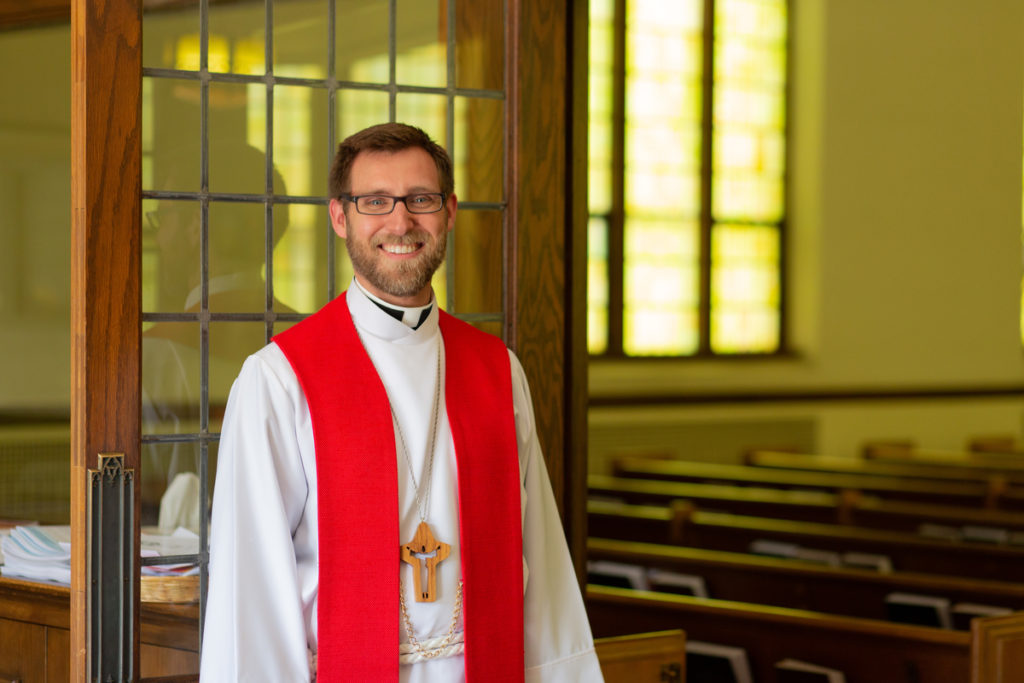Background Notes: One of the dangers and difficulties of discussing almost any issue these days is how easily any discussion can become highly divisively politicized. It is not the intent of Lutheran CORE to speak either for or against any political party or candidate. The political views of the friends of Lutheran CORE cover a very wide spectrum. In this discussion of Contemporary Critical Theory we are neither endorsing nor speaking against any political candidate or party. We are discussing an issue which we feel is critically important for Christians to be aware of and be prepared to deal with.
The First Reading for September 6 was from Ezekiel 33, where God compares the role of the prophet to the role of a military sentinel. Verse 6 says, “If the sentinel sees the sword coming and does not blow the trumpet, so that the people are not warned, and the sword comes and takes any of them,” God will require the blood of the people at the hand of the sentinel. In the same way, verse 8 says that if the prophet does not warn the people, God will require the blood of the people at the hand of the prophet.
Lutheran CORE defines its mission as being a Voice for Biblical Truth and a Network for Confessing Lutherans. As a Voice for Biblical Truth we feel called by God to serve as a sentinel to warn people of forces and movements in our world today – even in the church – that are incompatible with if not actually hostile to the historic, orthodox Christian faith. This is in addition to our role of alerting people to ways in which orthodoxy is being challenged and compromised within the church today.
One of the mindsets and movements that are growing and prevailing today – within our culture and, unfortunately, even within some segments of the Church – is Contemporary Critical Theory. There are two articles within this issue of CORE Voice which deal with this very powerful and I believe very dangerous force within our world today. This first article is intended to give you an overview and introduction to Contemporary Critical Theory. If you are not already familiar with this way of thinking, I am certain you will recognize it as the mindset behind much of what is happening in our nation and our world today. The second article is a longer and more detailed evaluation and critique of Contemporary Critical Theory. The intent of this second article is to show how this mindset is incompatible with and even a threat to the historic, orthodox Christian faith. Many thanks to Brett Jenkins, NALC pastor and former member of our board, for writing the second article.
There is a major difference between the claim that “there is no truth” and the claim that “there is truth, but we have a hard time seeing it on our own.” While those who are more orthodox-minded may be inclined to assert the latter, those who are not so orthodox-minded may be inclined to assert the former. The former has its roots in the claims of Contemporary Critical Theory.
Contemporary Critical Theory asserts that all knowledge is “socially constructed.” Therefore, there is no single, objective body of knowledge which all must accept. All of knowledge is rooted in experience, and we all have different experiences. My experience will be different from yours; therefore, the knowledge that is “socially constructed” by me may be different from the knowledge that is “socially constructed” by you. There is no body of knowledge which is wholly objective, as every area of knowledge is tainted with subjectivity. “Even the field of science is subjective.” (Robin DiAngelo & Öslem Sensoy).
Because we all have different experiences, we all have different levels of access to truth. The degree to which we have access to truth depends upon positionality: that is, I may have greater access to truth than you do, or vice versa, based on our respective positions in life. Greater value is given to the perspectives of those with positions in life that give us lived experiences that may provide us with greater insight on the topic(s) discussed.
The idea that there is such a thing as objective reality is looked upon with great suspicion, or even rejected entirely. Some say that, historically, those in positions of power and privilege have falsely claimed that things which are subjective are actually objective and have used these false claims in order to marginalize and oppress those without power and privilege. Some also say that the privileged misuse these false claims in order to normalize forms of injustice that we should not be accepting as normal. When this is done, “Those in power sleep well at night; their conduct does not seem to them like oppression.” (Richard Delgado).
Contemporary Critical Theory pays great attention to the particular demographic status of the person, and, based on that status, to whether the person might, in context, be considered privileged or marginalized (i.e., rich or poor, white or black, male or female, straight or gay, cisgender or transgender, etc.). The marginalized have the benefit of lived experiences which the privileged simply cannot experience first-hand. Because the marginalized have greater access to truth than the privileged, the voices of the marginalized are considered to be of greater value than the voices of the privileged. That is especially, but not exclusively, true of matters in which the lived experience of the marginalized provides particular insight into the matter being discussed. For example, a powerless person who has experienced discrimination at the hands of a person in power will be better equipped to explain such discrimination than a person in power who has never experienced such discrimination first-hand.
Contemporary Critical Theory warns that those with power and privilege do not easily give up their power and privilege. Rather, they establish institutions, rules, norms, and claims of objective truth in order to establish and protect their dominance in society. Those in power use all those institutions, rules, norms, and claims in order to subject the powerless to marginalization and oppression. When the dominance, power, and privilege of the privileged are challenged, they cast doubt on the validity of the claims of those who challenge them. Consequently, the act of questioning those who are marginalized, especially when done by those who are privileged, is frowned upon, looked upon with suspicion, or even forbidden entirely.
These are not just the opinions of a small number of peculiar individuals. Rather they are ideas that have spread far and wide in our society, even within the church. These ideas are driving forces, though not the only driving forces, behind several contemporary movements in the political and social arenas. These ideas are widely, but not universally, accepted. They have their critics, on the left as well as on the right. And there are those with more nuanced positions who will partially but not wholly accept these ideas. Nevertheless, the influence of these ideas is strong, with variants on the left and on the right. It is critically important for us to be aware of them, in order that we might be able to respond effectively.



























The problem with this cultural theory is that there is no vertical dimension to the arena of discourse. The conversation is strictly human-to-human confined with no third dimension involved. There is no appeal to authority outside what is discovered and managed within the scientific field of argument in that the third dimension is the critical mass of public opinion, ie. the peer group. The god (final authority) dimension is what the critical public or peer group measures and concludes. Scriptural authority cannot be a source in this because the proponents of this theory do not see what the church is saying in that Christ is risen and Jesus is Lord (authority) . But the church has the authority of the risen Christ through the apostolic preaching which is grounded in the scriptures as the third dimension. St. Paul did not receive his apostolic authority by way of a human source (see Galatians 1) but by Christ’s encounter of him. This Christ is the one who was crucified but now has been raised. Since death no longer has dominion over Christ St. Paul is encountered not by a dead person but a living Person (the only one who is designated for this). The church testifies to this authority because it has been commanded by Jesus to do this. The church can only witness to this and cannot prove it from reason but only through the living testimony of the scriptures spoken to others in their hearing.
George, thank you for your good words. The increasing anger, violence, and divisiveness in our nation and in our world show – beyond a shadow of a doubt – that mere human efforts will not solve our greatest problems. They are just too huge. Paul wrote to the Ephesians about how through the cross Jesus has “broken down the dividing wall, that is, the hostility between us.” (Ephesians 2: 14) The prophet Micah told us that God requires us (not just asks us, but requires us) “to do justice, to love kindness, and to walk humbly with (our) God.” (Micah 6: 8) May we have the power from God to do what He says, and may we not rebuild the wall that He has broken down.
Contemporary Critical Thinking, like its deconstructive cousin, performs two functions: 1) it keeps score, and 2) it can never be disproven. That explains its appeal to the lazy intellectual. What can’t be explained is when church leaders use such a corrosive and fraudulent theory approvingly. Then again, when my mother was attending Northwestern Seminary, she despaired that half her classmates didn’t believe John 14:6.
Cliff, thank you for your good words. We all need to be deeply concerned re the way in which so many within the church are embracing Contemporary Critical Theory. Re John 14: 6 – a voting member of the ELCA’s Churchwide Assembly last August proposed an amendment that would remove the section entitled “Limits to Our Knowing” from the “Declaration of Interreligious Commitment.” That section said, “We must be careful about claiming to know God’s judgment regarding other religions.” This voting member said that – based upon the clear words of Jesus in John 14: 6 – we do know how God feels about other religions. Discussion of the amendment was almost immediately cut off, the amendment was solidly defeated, and the “Declaration” was approved by around 97%. Since your mother attended Northwestern Seminary, the percentage in the ELCA who do not believe John 14: 6 has become close to 100%.
Another thought: Why has the teaching of scripture interprets scripture fallen in repute among some ELCA Lutheran preachers today? I would venture to say that the ELCA has been influenced too much by its open and, at crucial points, sub-critical acceptance of other Protestant even Roman Catholic ways to interpret scripture so as to jettison a Lutheran hermeneutic which is distinctive and unique. A good read of Apology 4 and the preface to the Formula of Concord in the Book of Concord forms a more accessible way to further the New Testament kerygma evangelically.
Thank you for your further thoughts and your concern that we maintain a distinctively Lutheran hermeneutic.